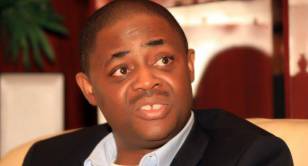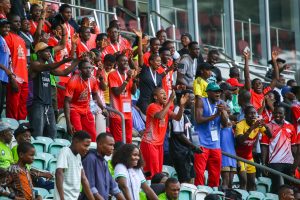Progressive Governors’ Forum Faults Fani-Kayode’s Planned Defection To APC

The Progressive Governors’ Forum has described the recent attempt to accept Femi Fani-Kayode into the fold of the All Progressives Congress as a clear attempt by some partisan members to manipulate the leadership of the ruling party into doing the wrong thing.
PFG in a statement titled “APC and the question of values” and signed on Friday by its Director-General, Salihu Lukman, applauded the insistence by many members and leaders that Fani-Kayode “was not welcome to join APC because he doesn’t have the values required to be a member.”
“Following the report about the controversial attempt by Mr. Femi Fani-Kayode to join the APC and the insistence by many APC members and leaders that Mr. Fani-Kayode is not welcome to join APC because he doesn’t have the values required to be a member,” the statement partly read.
“Dr. Sam Amadi, a good friend of mine argued that ‘APC has no defined values or defining values. APC is a normless contraption, like Nigeria.’ Another gentleman, on the platform of Prof. Toyin Falola, who facilitated USA Africa Dialogue Series asked the questions, ‘Are the parties (APC and PDP) anything more than instruments for capturing power? Do they have any significant ideological values?
“Are their members not the same people who have crisscrossed parties in the name of where to gain power?’”
Lukman said the issue of Fani-Kayode’s drifted attempt to join the ruling party is a ploy to manipulate some of her leaders into accepting membership of someone who ought not to have been considered a member of the party.
There were reports earlier in the week that Fani-Kayode, a chieftain of the opposition Peoples Democratic Party (PDP) was set to join the ruling party following a meeting with the Chairman of the Caretaker Extraordinary Convention Planning Committee (CECPC), Governor Mai Mala Buni, and Kogi State Governor, Yahaya Bello who chairs the mobilization committee of the party.
READ FULL STATEMENT HERE:
APC and the Question of Values
Salihu Moh. Lukman
Progressive Governors Forum
Abuja
Following the report about the controversial attempt by Mr. Femi Fani-Kayode to join the APC and the insistence by many APC members and leaders that Mr. Fani-Kayode is not welcome to join APC because he doesn’t have the values required to be a member, Dr. Sam Amadi, a good friend of mine argued that ‘APC has no defined values or defining values. APC is a normless contraption, like Nigeria.’ Another gentleman, on the platform of Prof. Toyin Falola, facilitated USA Africa Dialogue Series asked the questions, ‘Are the parties (APC and PDP) anything more than instruments for capturing power? Do they have any significant ideological values? Are their members not the same people who have crisscrossed parties in the name of where to gain power?’
These are very common question in Nigeria, and it is almost predictable, no matter the effort and evidence provided, it will hardly satisfy those asking the questions? Should one, therefore, bother to respond. The answer is resounding yes, if not for anything so that we are able to understand each other even as those of us who the questions are directed at may not be respected. Be that as it may, it is a burden which anyone who genuinely wants to campaign for positive change in our societies should be able to endure. Part of the difficult challenge is that we have increasingly pushed ourselves to a very grim reality whereby it is almost impossible to have a decent scholarly conversation. Our language is abusive and derogatory to one another. Against every odd, one will try to present the position as it should be or as it ought to be. In doing that, I will not want to be academic at all. And my objective is not necessarily to win any support even as it may be advantageous if that happens. The objective is just to highlight a perspective in terms of what should be the orientation we should have in order to contribute to the development of our politics.
Politics is a matter of choice. We make those choices not because parties we subscribe to are perfect. No party in the world is perfect. If anything, what eventually comes out as the defining value of a political party is the value of members. Often, the values of leaders equate to the values of political parties. Does this mean leaders have the same values? Hardly so. The standard is that there would be minimum shared values. Even when those minimum shared values reflect a consensus, there will have to be sustained internal struggles within parties to retain those values. We can theorise about this, but to be able to have sustained internal struggles within parties, there have to be people who commit themselves to take the necessary risks to initiate engagements with leaders to affirm the required minimum values.
Part of the tragedy we have in Nigeria is that there was a fundamental mistake made in 1998/99 when this democracy was being negotiated. Very few who could project the right values in politics gave the Fourth Republic any chance. Apart from many of our old politicians of the First and Second Republic who still had values, people like late Chief Alex Ekwueme, late Chief Bola Ige, late Alh. Adamu Ciroma, late Alh. Abubakar Rimi, etc. the emerging political space was largely vacant. Even in the case of people like late Chief Bola Ige, it is debatable if they joined the politics of the Fourth Republic with all the convictions and commitment.
Given very high conviction and commitment, Alliance for Democracy (AD) wouldn’t have been a junior partner in the alliance it had with the All Peoples Party (APP) in the Presidential contest of the 1999 elections. Maybe, if they had such a high conviction and commitment, given the politics of appeasing the Yoruba’s and South West on account of the injustice of the June 12, 1993 annulment, the dynamics of the negotiations that produced former President Olusegun Obasanjo as the leading candidate for the election would have changed. Or, it may have substantially altered the coloration of the leadership that emerged in 1999. Our democracy may have been saved from the highhanded orientation of PDP under the abrasive political management of former President Obasanjo.
There were many instances whereby people highly inexperienced and never prepared for any leadership roles, emerged as candidates of our leading parties and became elected. This is not a sectional issue. It is a reality that covered every part of the country. Once they get elected, they entrenched themselves. Unfortunately, the expectation that democracy will not survive didn’t happen. We are now 20 years into the Fourth Republic with no end in sight. Instead, it is getting more and more stable. Should we, therefore, continue to distance ourselves because we only expect the worse out of our democracy? Is our life vision only limited to expecting bad things?
With all its problems, there appears some progress in our democracy. It may not be the kind of progress anyone with a good knowledge of democracy should be happy with, but progress, nonetheless. What should be the attitude of every Nigerian, especially those that want to achieve some minimum target in their lifetime? What should even be those targets? If I have made the choice to join politics, should my target be to contest elections and therefore become one of the elected leaders based on which I am able to make a difference? How different will I be from others who have made similar choices but ended up as disappointments and in some cases being worse than the political leaders, we all complained about?
Being privileged people, able to articulate our position, most times we reduced these issues to some literary vocation. Almost in the passion of school debates, it becomes just a matter for or against our leaders. Politics require much more than that. If I want to be trusted, I must earn it, and perhaps the best way to earn it is to be able to risk trusting others. The big test of my commitment is what happens when our leaders betray trust? How am I able to detect that leaders have betrayed or are betraying trust? At what point am I able to detect it? Is it after the damage is done? Or am I able to detect it before the damage is done? What happens thereafter? Am I able to influence our leaders to initiate the process of rectifying the problem themselves?
These are practical issues. Part of the major problem why many of us in politics are unable to respond to these issues very significantly in a way that makes Nigerians to have confidence is that all of us in politics are fixated on the opportunity to hold elective or appointive positions. Once we are in those positions, we are hardly able to take risks that will enable us positively to respond to these issues. We end up blaming our leaders for our failures. As knowledgeable as we may be, we limit ourselves to being sycophantically loyal to our leaders just so that our positions are not threatened. Sadly, those who made the choice not to join politics are hardly any different because for them politics is all about elections. Again, it is reduced to support for or against leaders.
As activists who have spent all our lives in the business of advocacy for societal change, we need to be courageous to engage these issues with a commitment to producing some practical responses no matter how little in our national politics. When one encounters the kind of statement about Nigerian politics is a ‘contraption like Nigeria’ from enlightening people like Dr. Amadi, it is quite worrisome. What in this world is not a contraption? Even our personalities, is it not contraption? Why did God have to send us to this world through the union of men and women? After sending us down to this world, we had to go through processes of socialisation that defined us in so many different ways. We became races, tribes, religious groups, etc. How many influences did any of us have in all the processes of human contraptions that ended up conferring us with all the different identities which today we use as justifications very liberally for hating one another?
Often, we use all these aggressive languages to weaken the confidence of people we regard as opponents. It is a universal reality. It is the same strategy used to promote racial and gender inequality. Therefore, we can be proud of our identity, our choices, etc. but once we begin to speak to each other in derogatory terms, we lose our humanity. If our politics is defined only in those derogatory terms, then we are as useless as any other leader we seek to condemn. It doesn’t matter our sophistication, qualification, or any quality we chose to claim.
Therefore, everyone can make his/her choices. For Dr. Amadi and all my PDP friends and colleagues, I will always respect your choices. Thanks to Mallam Nasir El-Rufai, at the beginning of my partisan political adventure in 2010, one of our dream was to reform the PDP. I was proud to be associated with very brilliantly high-flying aspiring Nigerians, including Dr. Amadi, in that adventurous vision. We had very good inspirations from Sen. Ken Nnamani and Rt. Hon. Aminu Bello Masari. With their popular political credential of extinguishing any political oxygen in former President Obasanjo’s term, it was a dream come true to be associated with such credible political leaders. Together with many PDP leaders, these leaders were able to force a campaign for reforming the PDP around 2009/2010. The failure of that campaign was the beginning of the disintegration of PDP. This is never because of any plan by anyone to destroy the party.
Without going into details, the capacity to test a wide range of political options assisted to create the needed confidence for merger negotiations of our opposition parties in 2012/2013 that led to the emergence of APC. It is important to recognise that for leaders of our legacy parties to successfully negotiate the merger, it meant that they were responsive to the reality that without being able to merge they can’t win elections at the national level. You can say that the negotiation only produces an instrument for capturing power. What is wrong with that? Would you have rather preferred APC or any preferred party becoming a permanently defeated party? That APC is succeeding in capturing power is the reason why we are having this debate. It is far more encouraging to engage the debate, on our part as APC members, because the party is succeeding in winning elections if you like capturing power. Is there any successful political party anywhere in the world that is not an instrument of capturing power? If your pain is that APC is emerging as a successful political party, the best advice one can give is that those who are opposed to APC should work hard to produce the party that can defeat the APC.
The fact of being successful is what is attracting almost everyone desirous of accessing political opportunities to join our party. No doubt, that is not good. But it must be stressed, it will require strong internal contestation to control that. Again, that we are as a party debating the issue of who should join our party or not represent the qualitative difference between the APC and PDP. If it were PDP, once the National Chairman of the party act on a matter and backed by a serving governor, members can only grumble. I am proud to have my voice guaranteed and affirmed by my leaders in APC. As an employee of Governors, it has been a privileged opportunity to speak out openly on matters within the purview of leadership initiative. Rather than my leaders, including our Governors, relating to me as a subordinate who should only take instructions, they recognize and respect my views as a loyal member of the party. Part of the responsibility that imposes is that we should be able to speak out to protect and defend our leaders and our party.
Being a party that is evolving, part of the challenge is to take every step to encourage our leaders to allow internal debate in the party. We may be in denial that APC was able to deepen political competition in the country through internal contestation. Part of the internal contestation going on will be eventually what can strengthen the definitive credentials of the party. This is not to suggest that there are not indicative defining credentials. If anything, the current debate about values reminds one of some of the discouraging public commentaries during the merger negotiations. There was almost a public consensus at the time of the merger that it was not going to succeed. PDP did everything necessary to demonstrate that even if it succeeds, it will be hopeless as the new party will not be able to win elections.
All these are now history. It is clear that those of us in APC commitment to supporting our leaders to transform the party into a viable democratic platform need to work even harder. In doing so, we must not allow the current public mindset of condemning politics, our leaders, and our country to provoke us into being defensive and therefore unable to have the needed strategy and confidence to engage our leaders. The challenge of protecting our leaders and our party is not about denying wrong actions but when wrong actions are taken, is it possible to correct them?
There will be many instances of the possibility that our leaders and our party may take the wrong decision. Our capacity to correct those wrong decisions is what our politics require and not some fantasies. No amount of declaration, whether with reference to values or ideology can develop our politics, our parties, our democracy, and our nation. It is our capacity to get things done and especially get wrong actions corrected that can develop our politics, our party, our democracy and our nation. The issue of Mr. Fani-Kayode’s drifted attempt to join the APC is a clear instance of attempts to manipulate some of our leaders into accepting membership of someone who ought not to have been considered a member of our party. If that was the case in the past, it is better late than never to correct such a mistake.
As party members, we were able to rise up to the challenge of engaging our leaders. Fortunately, we are able to gain the respect of our leaders, and surely, moving forward, issues of who qualifies to be a member of our party will be clarified unambiguously. Maybe this could challenge the PDP and other parties in Nigeria to begin to address issues related to their failings. It is a process, not a once-off action. If you don’t agree with this position, abusing the APC, its leadership or members, including this writer will change nothing. You are most welcome!







